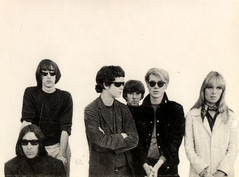 |
| The Velvet Underground (Photo: thatspep) |
The counterculture revolution of the 1960s is one of the most significant steps in western cultural development of the 20th Century.
From the very beginning trickle of its inception, to its height during the Vietnamese war, music was a big source of its driving force, contributing to the achievements that it helped to bring about, but also laying some of the foundations for its downfall.
With a focal point around the United States and the United Kingdom, it's influence spread throughout western civilisation and beyond, but where it all began is hard to say. However, the most important ingredient in its development was the burgeoning distrust of the established order of things, and in particular the senators, congressmen and presidents that pulled the strings.
The heightened tension of the cold war, the fear of the bomb, the assassination of President John F. Kennedy, racial segregation and voting rights, the persecution of communists and the Cuban communist regime, police brutality, the Vietnamese war and the increased use of psychedelic drugs all coalesced in the 60s and early 70s to fuel the fire for the counterculture movement.
Music was at the heart of it all, from the folk movement led by the likes of Bob Dylan, Phil Ochs and Dave Van Ronk to the release of "Revolution 1" on the Beatles' White Album. The music gave the children of the counterculture revolution new sources of inspiration and a centre around which to base their dissatisfaction with the established order of play.
In addition to the songs and bands that talked about protest in one way or another, there were also those that talked about freedom in general, pushing the rules of convention to their outer limits. The Velvet Undergrounds lyrics for example include references to transgender, homosexuality and drug use in a way that had never been seen before, while bands like the Beach Boys are cited as big proponents of peace, love and understanding.
One of the biggest things to develop out of the counter culture of the 60s and early 70s is the large-scale music festival. Folk festivals were well established in the early sixties - Bob Dylan's electric guitar at the 1965 Newport Fold Festival has taken on near legendary status, for example - but it wasn't until the Monterey Pop Festival, which launched Jimi Hendrix to the big stage, the Isle of White Festivals and Woodstock that the idea really took off. The fact that this type of festival has become so widespread in recent years is a testament to the musical legacy of the 60s.
The counterculture movement ground to a halt around '73 and '74 with the end of the Vietnamese War, Nixon's presidential resignation and the implosion, corruption and exploitation of the free love era.
Whether it ended with the removal of things to protest for, the move away from psychedelic drugs as the hit of choice or the disenfranchisement with the excessive hedonism that typified the latter parts of the movement it's hard to say for sure, but the impact of everything that occurred during that period is still being felt today, including the music that helped to produce it and that it helped to produce. Civil rights became universal, new forms of expression became acceptable, wars were ended and music was made.
Tuppence Magazine is an online publication for entertainment news in the UK, including restaurant reviews like Spicy Basil Kilburn and film news like Mad Max 4 movie info.
Article Source: http://EzineArticles.com/?expert=Gerard_Harris
http://EzineArticles.com/?The-Music-That-Forged-the-Counterculture-Revolution-of-the-1960s&id=4582444

No comments:
Post a Comment